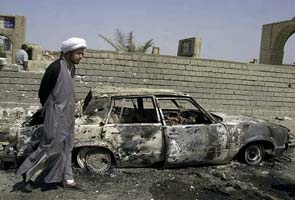
The findings come during what U.S. Special Inspector General for Iraq Reconstruction Stuart W. Bowen Jr. called "a summer of uncertainty" in Baghdad over whether American forces will stay past a year-end withdrawal deadline and continue military aid for the unstable nation.
"Iraq remains an extraordinarily dangerous place to work," Bowen concluded in his 172-page quarterly report to Congress and the Obama administration on progress - and setbacks - in Iraq. "It is less safe, in my judgment, than 12 months ago."
The report cited the deaths of 15 U.S. soldiers in June, the bloodiest month for the U.S. military in Iraq in two years. Nearly all of them were killed in attacks by Shiite militias bent on forcing out American troops on schedule.
It also noted an increase in rockets launched against the heavily fortified Green Zone in Baghdad, where government offices and foreign embassies are located, as well as constant assassination attempts against Iraqi political leaders, security forces and judges.
Additionally, the report called the northeastern province of Diyala, which borders Iran and has an often volatile mix of Sunni and Shiite Muslims and Kurds among its residents, "very unstable" with frequent bombings that bring double-digit death tolls.
Bowen accused the U.S. military of glossing over Iraq's instability, noting a statement in late May by the U.S. military that described Iraq's security trends as "very, very positive." In contrast, Bowen talked of "the very real fragility" of national security in Iraq and compared the current situation to the days of 2007, when the country was on the brink of civil war.
A spokesman for the U.S. military in Iraq declined to respond.
If the U.S. military leaves on schedule, the American Embassy in Baghdad will pick up the responsibility of training Iraqi police. Bowen called the job "challenging" for the fewer than 200 advisers who would be based in three sites but tasked with supporting Iraqi police in 10 of Iraq's 18 provinces. There are an estimated 400,000 policemen in Iraq.
Baghdad and Washington are negotiating whether to keep the U.S. military in Iraq beyond the December deadline. A Saturday discussion about the Obama administration's offer to keep 10,000 troops in Iraq to continue training security forces has been postponed, despite earlier hopes by Prime Minister Nouri al-Maliki that the meeting could yield an agreement.
Al-Maliki says the decision ultimately will be put to parliament. While many officials from both nations believe Iraq is still too unstable to protect itself without U.S. help, keeping a large presence of American troops may be difficult to sell to an Iraqi public tired of eight years of war.
Bowen also said his inspectors published six audits over the last three months, including reviews of U.S. government contractor Anham, LLC, which is based in suburban Washington. The review found that Anham allowed its subcontractors in Iraq to overcharge the U.S. government, including a $900 bill for a control switch that cost $7.05 and $3,000 for a circuit breaker worth $183.30.
As a result, Bowen's inspectors are seeking to review all Anham contracts with the U.S. government in Iraq and Afghanistan, which total about $3.9 billion.
Anham official Hassan Judeh at the company's headquarters in Vienna, Va., did not have an immediate comment.
No comments:
Post a Comment